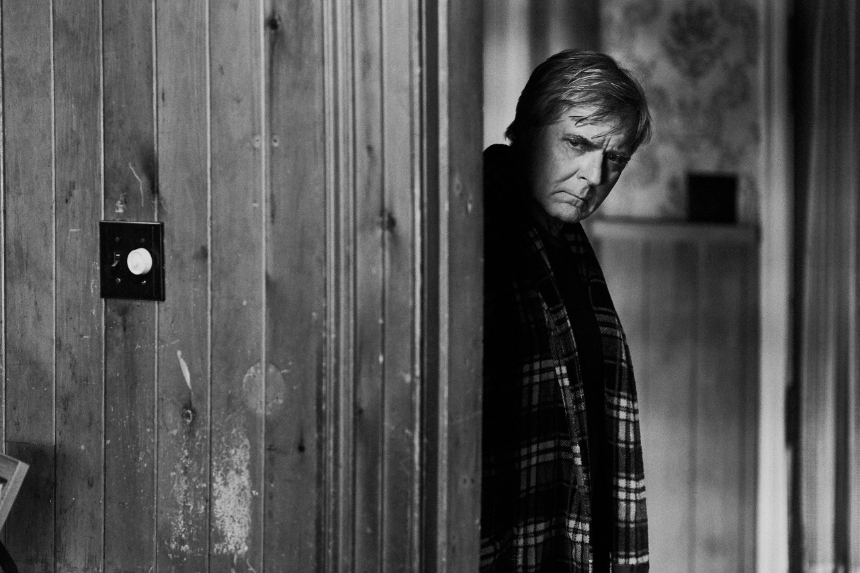Calgary Underground 2022 Review: THE RIGHTEOUS Offers A Stark Portrait of Guilt

The Righteous opens with the funeral of a young girl. Her mourning adopted parents, an ex-priest and his wife, still maintain active ties with the biological mother. There is an awkward visit in the family living room, adorned with many pictures of the deceased child. Doris (Kate Corbett in perpetually running mascara), the somewhat dim, jittery mother, a young woman clearly aging faster than she should by working dead-end jobs and living in poverty, gave up raising her child, likely for mental health reasons. The pressure to be polite and accommodating, by Frederic (Henry Czerny) and Ethel (Mimi Kuzyk), in this socially fraught situation, where the all around pain is this raw is uncomfortable to watch, even as it gives off unquestionably Canadian vibes. Doris tells Frederic that he is a good man. He looks acutely self-conscious, and makes excuses about having many things to do with the remainder of the day before ushering her out of their home.
This film is a slow burning tragedy of strain, filmed in the high contrast black and white, and set in the visually alien interior woods of Newfoundland. This is no CBC tourist advertisement of the photogenic maritime province or Come From Away down-home generosity. It oozes cabin fever, complete with wintry, leafless deciduous trees (a rarity on the island) and good old-fashioned catholic guilt.
Veteran character actor Henry Czerny has been a Hollywood and TV stalwart for decades, whom I strangely almost mis-remember as the skeevy-for-no-reason packing peanuts pitchman, in Ang Lee’s The Ice Storm. Here, he gives a haunted and complex lead performance. Frederic is a man who has been constructing a polite, competent facade as a protective wall around his personal cowardice and religious shame, which slowly unfolds, and reveals itself, under the increasingly tense obligation to be a good host to a stranger in distress.
The film opens with the funeral of child, but the real catalyst is the mysterious young man, Aaron Smith, who shows up on the doorstep in the middle of the night with a foot injury that he cannot quite explain properly, and a reason for being out in the wilderness at night bordering on ridiculous in its vagueness. Aaron lays it on quite thick, with pleas for help, mixed in with fawning politeness through his distress, and unexplained notions of amnesia. Against the initial anxiety and protestation of Ethel, Frederic brings Aaron into their home, and what ensues for the next hour is a strong riff on Pier Paolo Pasolini’s Teorema, only with the sexual transgressions (and bourgeoisie deconstruction) of that 1960s cult arthouse classic swapped out for polite social graces and subtle passive-aggression; one of the ‘secret hallmarks’ of Canadian society (also not shown on CBC advertisements.)
Most of the action takes place inside the isolated country house. The home is filled but not with tasteful antique bric-a-brac, and is a testament to considered production design. Frederic and Ethel appear to reasonably well off, and living in isolation by choice, the priesthood is a solid racket in rural Newfoundland, probably with good retirement benefits. But the house is also a cloistered prison, where Frederic is constantly driving in nails - he boards up his daughters room at one point - or removing them, when he tears down her swing-set. Aaron crosses every social normative boundary of a house guest, ingratiating or threatening himself into private matters, and dancing around serious sins, like in a Eugene O’Neill play. Aaron and Frederic settle into a friction where they only seem to answer each others direct questions with other dodging questions. Ethel, who also knows things, coming in and out of the power struggle, but somewhat adjacent.
The films eventual arrival into a kind of wormwood, in the biblical sense of a bitter corruption of everything, which feels surprisingly earned, for this debut feature from Newfoundland actor Mark O’Brian who also plays Aaron. It is both literal and figurative, and goes exquisitely with its monochrome photography. I freely adore this growing micro genre of Teorema-inspired psychological passion plays with wildly different styles, including Takashi Miike’s Visitor Q, Adam Wingard's The Guest, and Yorgos Lanthimos’ The Killing of A Sacred Deer. Welcome to the club, Mr. O’Brian, no need mind your P's & Q's.
The Righteous
Director(s)
- Mark O'Brien
Writer(s)
- Mark O'Brien
Cast
- Henry Czerny
- Mark O'Brien
- Mayko Nguyen

Do you feel this content is inappropriate or infringes upon your rights? Click here to report it, or see our DMCA policy.






